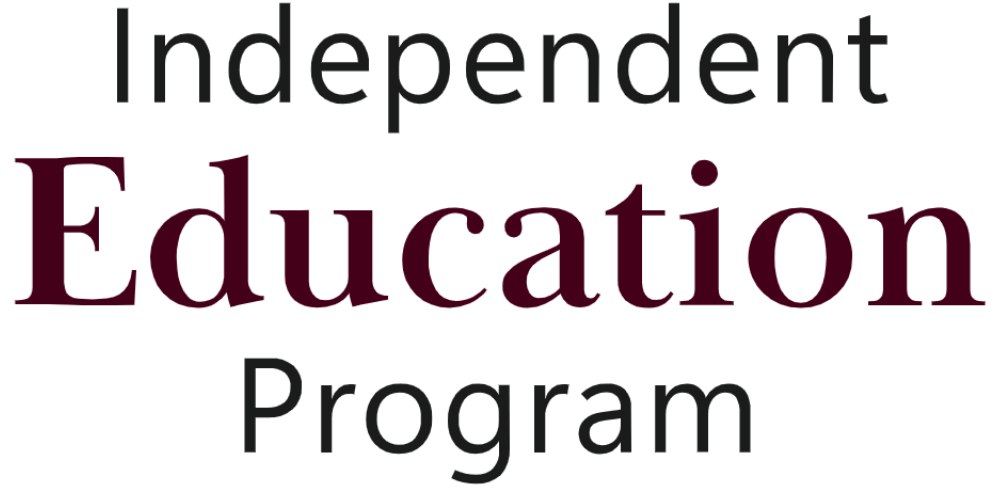It’s been a great start to the year! Thank you for everyone’s enthusiasm and help as we’ve worked through everything that comes with a new school year. This newsletter is full of things you don’t want to miss!
- “Hinge Points in Motion” article by Adrianne Thygerson
- Robotics Showcase
- Civil Discourse in America Seminars
- Speech and Debate Tournaments
- Wall Talk Podcast
- Alumni Corner
- Food Drive and Jingle and Jive
- Parent Alumni Tournament
- Healthy School Year
- Homecoming Dance
- BYU Classic Speech and Debate Tournament
- Moot Court Competition
- 1st Amendment Speech Contest Finalists
- IPPF Competition
- Model UN at BYU
- “Hatred Begets Hatred” article from our General Director, Sam Martineau
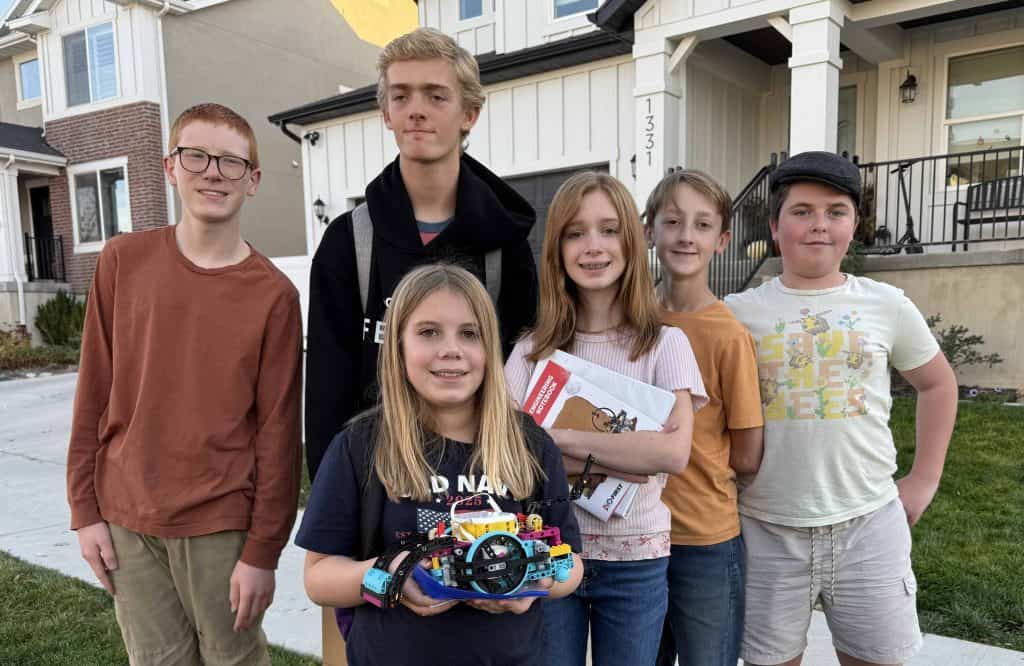
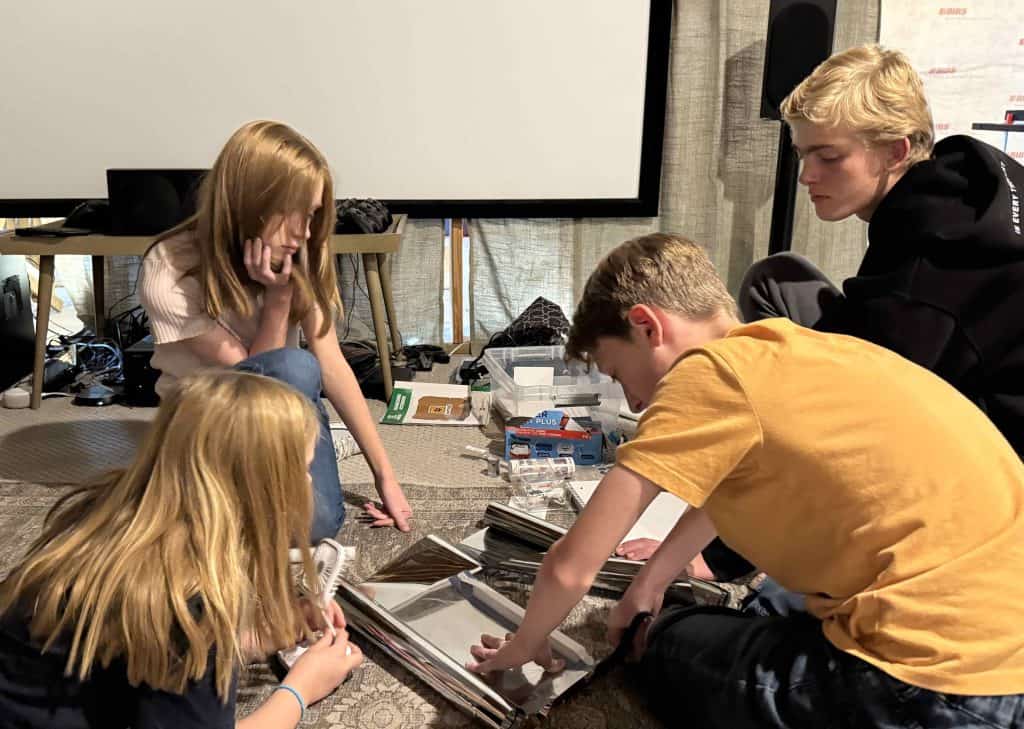
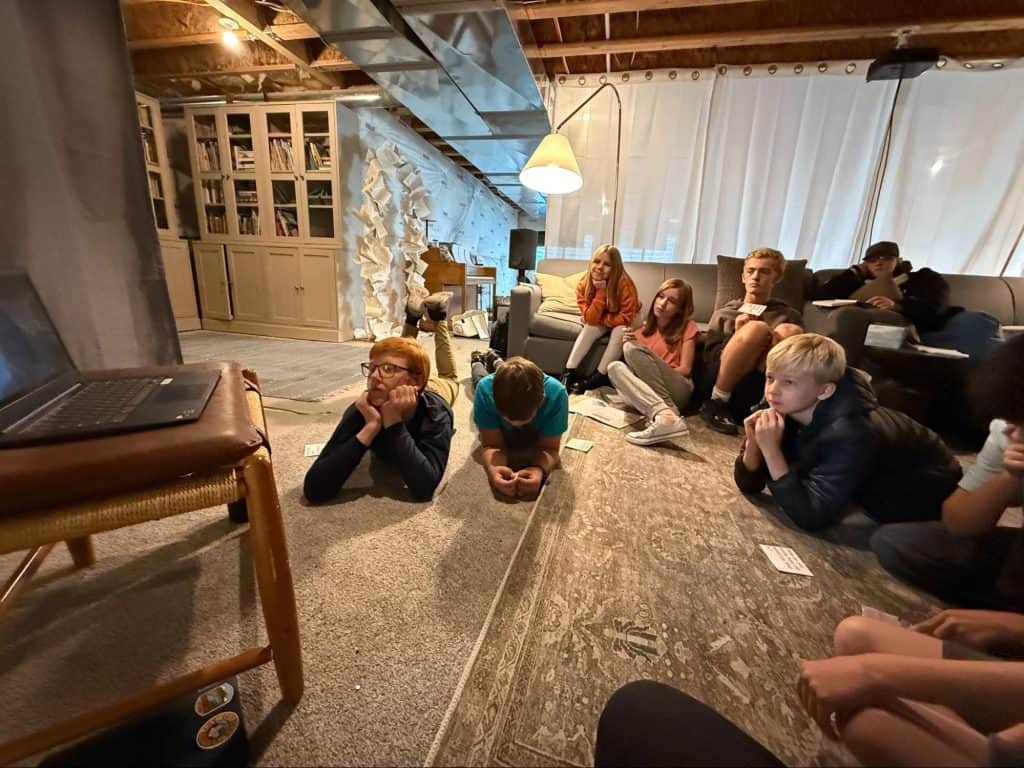
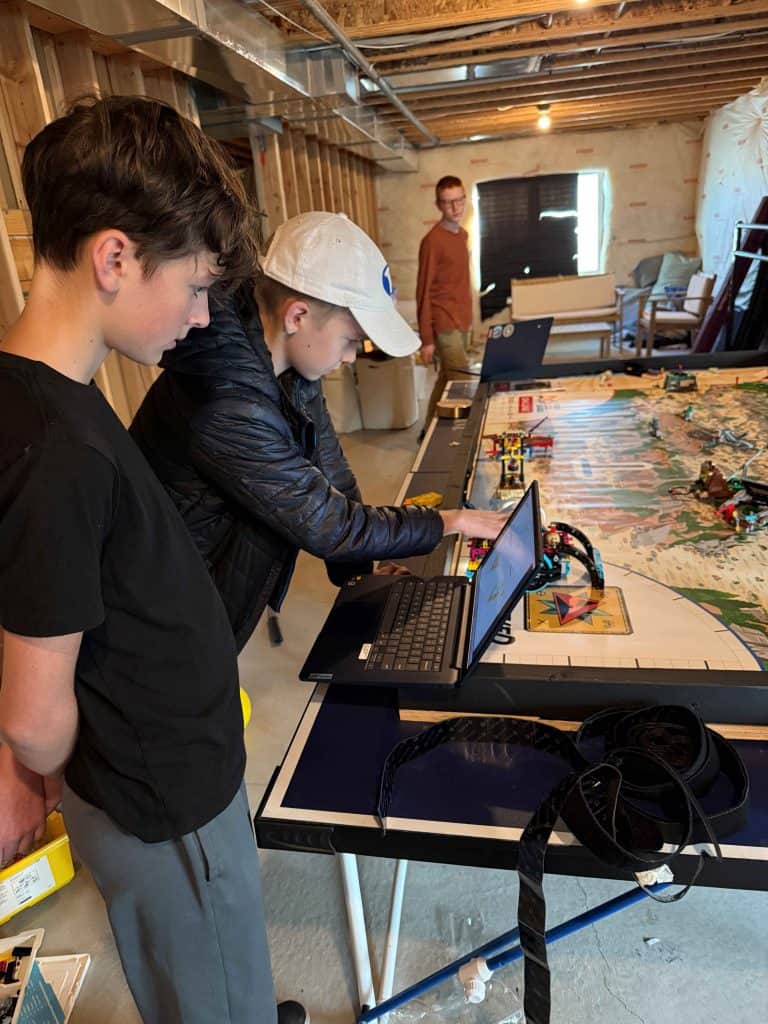
In the Classroom

By Adrianne Thygerson
Robotics Director and Teacher
Hinge Points
I taught Robotics classes and led Robotics teams for many years. I returned to that this year as a teacher and the Director of the Robotics Program in the IEProgram. It has been fun to watch the season start across all three levels of the robotics teams – Explore, Challenge, and FTC.
This week, my Challenge team met with an archeologist from the University of Michigan in an online meeting. Afterwards, I watched as the team animatedly discussed solutions for problems archaeologists face. I wonder where the connections, learning, and inspiration they are experiencing will take them. I’ve seen how hinge points—those small but powerful moments – can change a young person’s direction.
I recently reconnected with two brothers who were on my very first Challenge team over fifteen years ago. During a season focused on biomedical engineering, one of them became captivated by the topic. That spark turned into a lifelong passion; today, he’s pursuing a Ph.D. in Biomedical Engineering at San Diego State University.
I’ve seen many similar stories—former team members who discovered a love for business, math, or engineering and went on to build startups or join innovative companies.
Now, as I look around a bustling basement workspace filled with conversation, ideas, and a bit of creative chaos, I can’t help but wonder—am I seeing another hinge point in motion? Who will be inspired this season? And where might it lead them?
Coming Up
Robotics Showcase
The Robotics classes and teams are holding a Showcase on Friday, December 5th from 1:30-3:00 at the Sandy Library (10100 Petunia Way, Sandy).
The Explore teams (ages 7-10), Challenge teams (ages 10-13) and FTC team (ages 14+) will be showing and sharing their projects, their robots, and all the things they’ve been working on. Come celebrate them and learn more about all the great things happening in robotics!
This is a great opportunity to check out the robotics programs for students ages 7-18 – especially if you might be interested for next year. Everyone is invited!

Arguing for America Seminar
We are excited to invite you to Arguing for America, a seminar presented by The Independent Education Program, with Mary Stoddard, the director of the Constitution Studies program, as speaker.
In this seminar, Mary delves into the history of civil discourse, the complex political theory that makes it more than just a conversation, and the impact it has on the world around us.
This seminar is free to the public and geared towards adults and older teens. Register to attend here: https://forms.gle/uP1umKvmicE3G7QN6
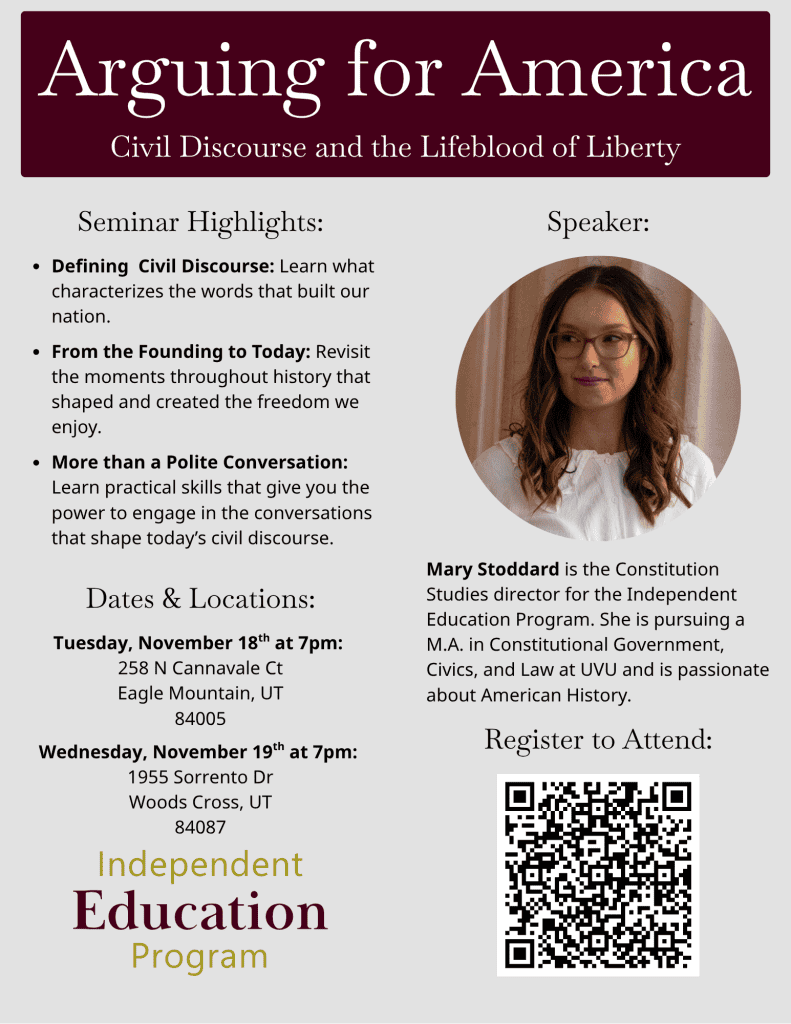
November Speech & Debate Tournament
The November Tournament will be on Saturday, November 15 at Weber State. We need many judges for each tournament and appreciate all the parents and alumni who help judge!
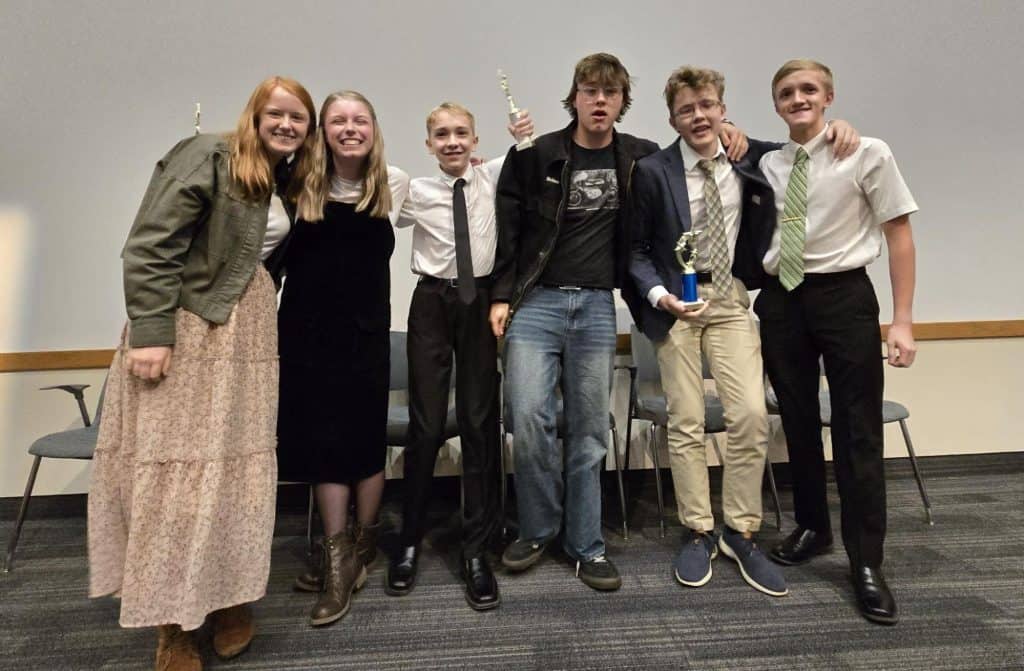
December Beginning Speech & Debate Tournament and Ethics Bowl
We’re shaking things up and will have a Beginning Year Speech and Debate Tournament in December. It will be for first year students only with Impromptu, Spar, and Oratory as the events. All other students who would like to participate will be able to compete in the Ethics Bowl. The December Tournament will be on Saturday, December 13 at Paradigm in West Jordan. Registration opens on November 17 for competitors and judges. Hope to see you there!
Wall Talk – A Podcast For and By Students
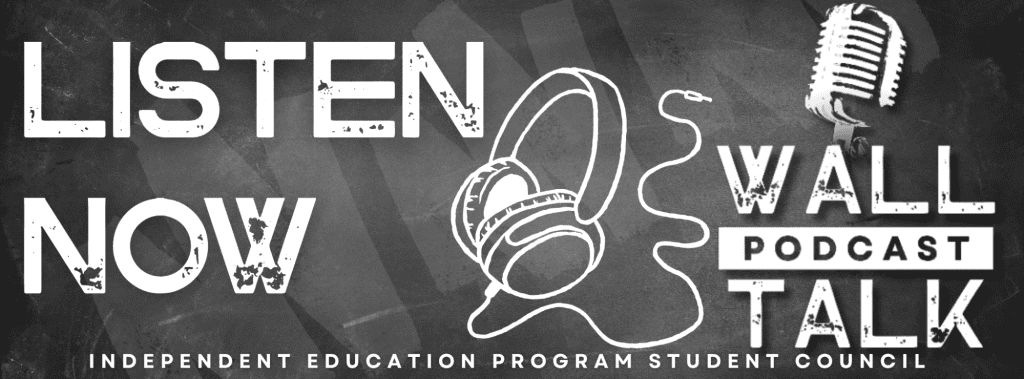
The Student Council has brought back Wall Talk – a podcast for students to share their thoughts and opinions on current events. It’s fun to hear all the opinions! The podcast is hosted by Justin Hatch and recorded weekly. Any IEProgram student is invited to be a guest on the podcast. Listen to Wall Talk on Spotify here. Students can sign up to Be a Guest on WallTalk.
Food Drive and Jingle and Jive

The Annual IEProgram Food Drive is coming up from December 1-19. Students will be gathering food and monetary donations to benefit their local Food Bank. Students typically raise thousands of pounds and dollars. Thank you for supporting them in any way you can! Students will celebrate the Food Drive effort with the second annual Jingle and Jive Stomp. Keep watching for details!
Parent Alumni Tournament – Save the Date!
Save the date for the Parent Alumni Tournament on Saturday, December 27, from 12:00 pm to 5:00 pm followed by an optional dinner. All parents and alumni are invited to compete. The events will be Impromptu (parents only), Oratory, and Presidential Debate. Elite students and students with a parent participating in the tournament can judge. Registration opens Monday, December 1.
Healthy School Year
Healthy School Year is off to a great start. Activities are free and any teens are welcome to join in the activities. You don’t have to currently be taking IEProgram classes, but you do need to register for the Healthy School Year activities.
Current Healthy School Year Activities
Weekly Workouts with Sam Martineau Friday mornings from 8:00-9:30 in West Bountiful
Weekly Workouts with Sam Martineau Tuesday afternoons from 3:30-5:30 in Lehi
Recent Happenings
Homecoming Dance
The IEProgram’s first annual Homecoming Dance, “Falling for You,” was held on Saturday, October 11 in Syracuse. It was a rousing success with over 250 students participating! Thank you to everyone who came and the Student Council who helped with planning – Mattox Botkin, Calvin Darley, Betsy Shea, Eliza Hepworth, Maddi Brunner, Melanie Smithson, Nathan Childress, and Shawn Walker. You can see all the fun in pictures here. Homecoming Photos.

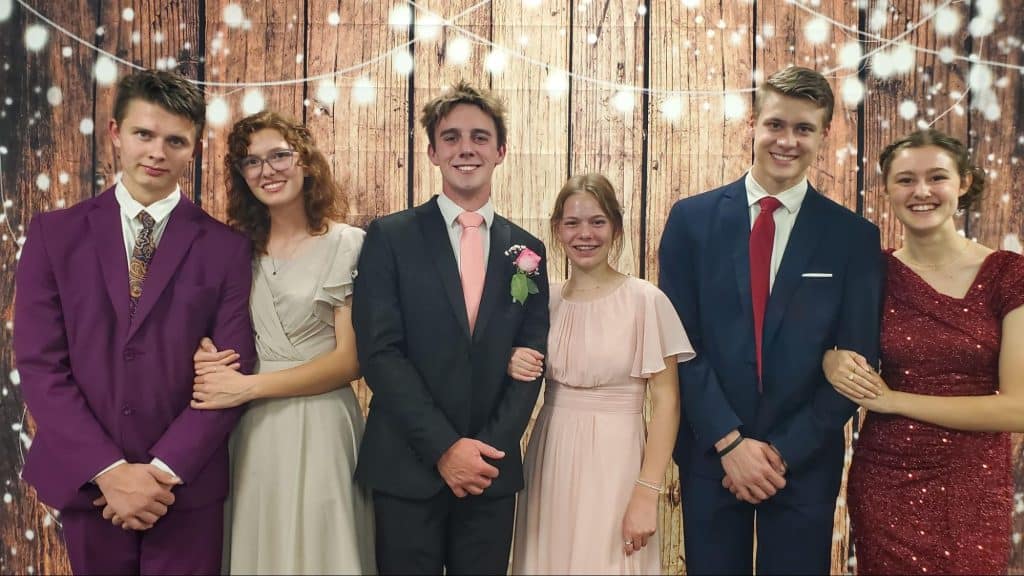
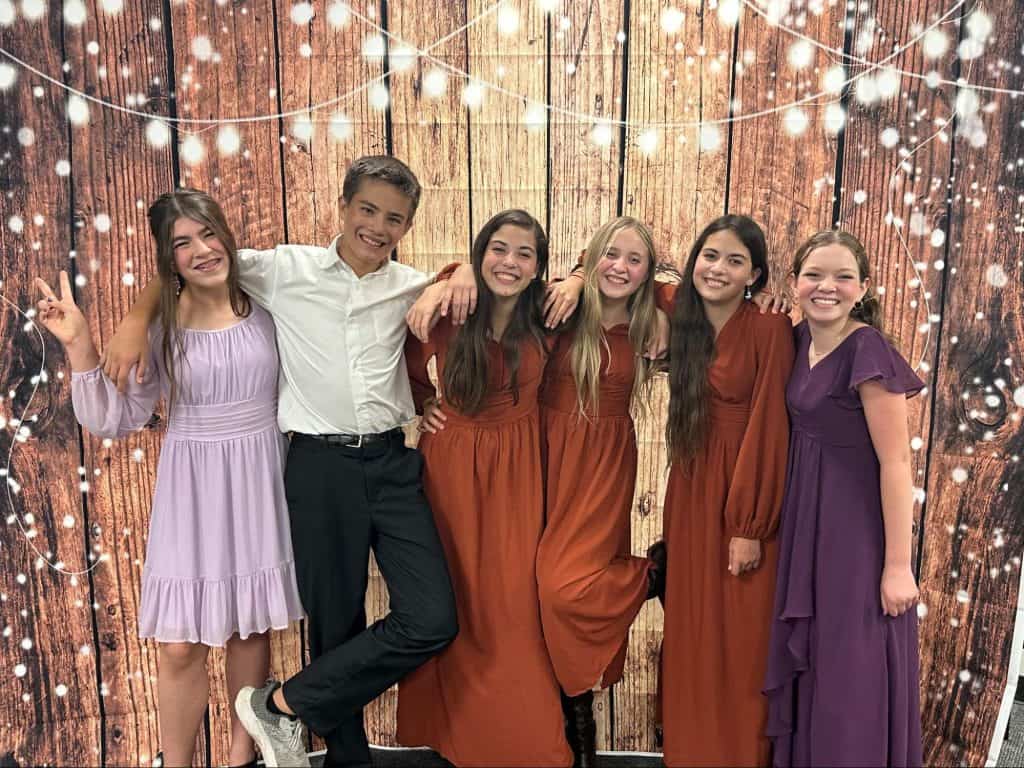
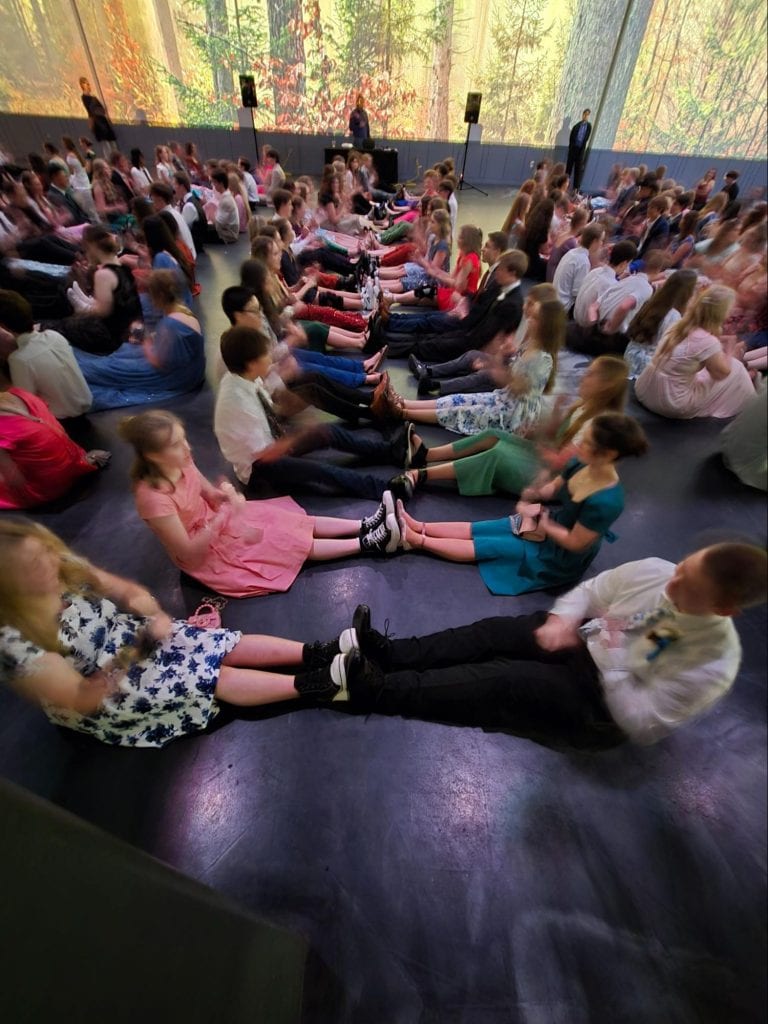
BYU Classic Speech & Debate Tournament
The first Speech and Debate Tournament of the year was held at BYU on Saturday, October 25. So much thanks to BYU for hosting us! It was the largest Speech and Debate tournament ever with 431 competitors and 90+ judges! Congratulations to all of the competitors and especially all the beginning students competing for the first time! You can see Tournament Pictures Here and Results Here.
Moot Court Competition
On November 1, students participated in the annual Moot Court Competition run by the Constitution Studies program. Students submitted legal briefs and argued a fictional case involving constitutional issues like equal protection, free exercise of religion, immigration law, and more. A huge thank you to our staff and judges, and a huge congratulations to our winners! Moot Court Competition Photos
Oral Arguments:
- Adrian Lopez
- Joy Stock & Ben Orchard
- Alana Bassett & Madelyn Park
- Sabrina Olsen
Brief Writing:
- Adrian Lopez & Apollo Moser
- Brigham Hahn & Morgan
- Adams
- Joy Stock & Ben Orchard
- Alana Bassett & Madelyn Park
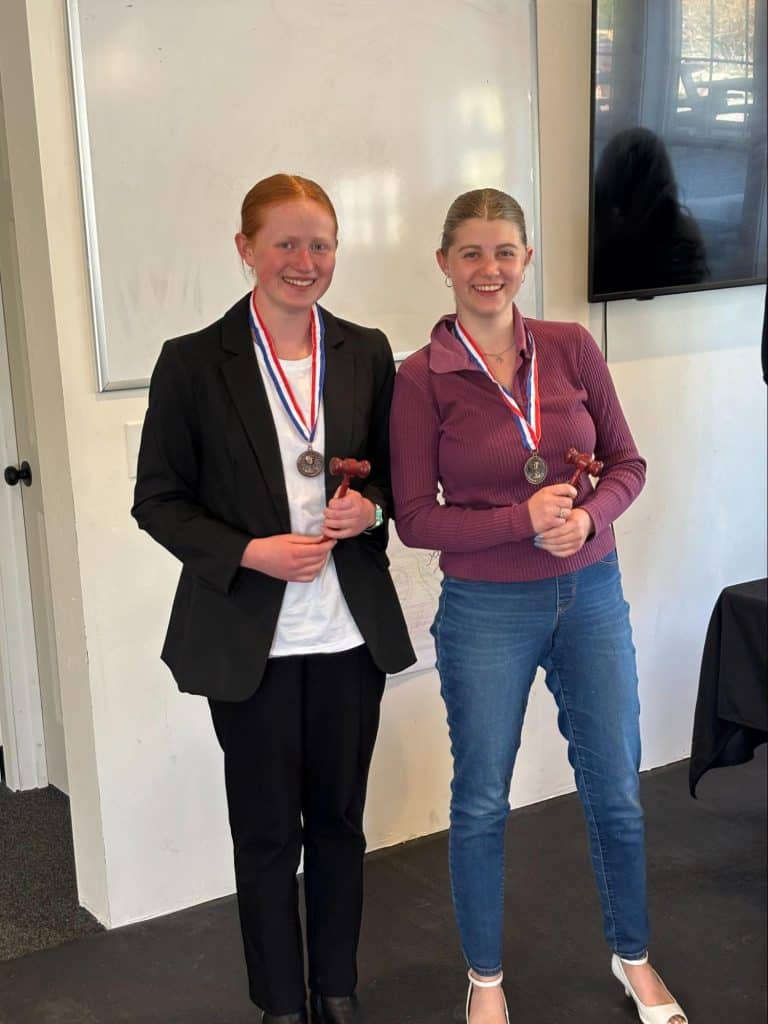
1st Amendment Speech Finalists
Congratulations to all the students who participated in the 1st Amendment Speech Contest with tributes to victims of communism. There were many IEProgram students (and their siblings!) who gave speeches.
The finalists will be speaking this Friday, November 7 at 6:00 pm at the Utah State Capitol Rotunda. The event is free and open to the public. The dress is black and white.
Below are the finalists with IEProgram ties and the freedom and victim they spoke about.
Grades 1-4:
Faith Moore: Freedom of Religion, Richard Wurmbrand, Romania
Grades 5-8:
Maverick Moore: Freedom of Press, Paul Goma, Romania
Carissa Roberts, Freedom of Speech, Xu Zhi Yong and Ding Jia Xi, China
Auri Walker: Freedom of Speech, Doina Cornea, Romania
Alternates:
Dulce Hansen: Freedom of Religion, “Mr. Lin,” China
Hans Hepworth: Freedom of Press, Aleksandr Solzhenitsyn, Russian writer
Grades 9-12:
Katie Bell: Freedom of Speech, Eduard George Atomei, Romania
Joy Moore: Freedom of Assembly, People of Tuisuara, Pastor Tolkis December 1989, Romania
Sophie Shields: Freedom of Speech, Nikolai Gumilev, Russian Poet and Soldier
Heber Tanner: Freedom of Speech, Sergeant James Johnson, USA
International Public Policy Forum
The IEProgram entered 11 teams into the International Public Policy Forum competition – an intense, highly competitive, international, written debate. The resolution this year was:
Resolved: The Group of 20 Nations should levy a global education tax equal to 1% of each member country’s gross domestic product to establish a dedicated international organization that supports the provision of universal, free, quality primary and secondary education.
We’re so proud of all our teams who competed!
- Nathan Shields, Ivana Gleason, Samuel Hansen, Shawn Walker
- Teancum Whitchurch, Lily Ratzlaff, Isaac Yeager
- Cameron Barney, Andrew Bruning, Carson Smith, Katie Bell
- Hannah Kent, Sophia Shields, Madelyn Park
- Daisi McKeon, Zoe Whiting, Mike York
- Daphne Ferguson, Eliza Hepworth, Abbey Baldwin, Elle Woodruff
- Madelyn Brunner, Melanie Smithson, Jase Mitchell
- Justin Hatch, Mattox Botkin, William Horlacher, Betsy Shea
- Sarah Nielson Matthew Jordan, Abby Callister
- Chelsea Gibbons, Lydia Erickson, Joy Stock, Eleanor Curtis
- Kate England, Lillie Shrewsbury, Newell Salt, Christian Hess
- Marianne Buck, Olivia Madill, Max Luke
- Riley Smith, SueHaley Frandsen, Mabel Talley
BYU Model UN
Congratulations to the 64 members of the WIDL Model United Nations Team who competed at BYU Model United Nations on October 31st. Representing eleven different countries, they engaged in diplomacy with 500 students from many schools across the state. The delegation received half of all the top awards and did an excellent job. You can see pictures from the event here: Model UN Photos
Model UN Results
Delegation for Poland (Outstanding Delegation)
- Micah Pitcher and John McCleve
- Ivory Henage and Kate Cullimore
- Martha Holloman and Kimaria Robinson
- Vidalia Armstrong and Avi Shea
Delegation for Senegal (Outstanding Delegation)
- Elle Woodruff and Jana Taylor
- Jordan Clark and Isaac Wright
- Aurora Davidson and Quinton May
- Adrian Lopez and Jack Mangelson
Delegation for India (Outstanding Delegation)
- Abigail Mock and Katie Bell
- Sophia Shields and Cameron Barney
- Lucas Mock and Andrew Bruening
Delegation for Ukraine (Distinguished Delegation)
- Noelle Smithson and Melanie Smithson
- Madelyn Park and Brindlie Simonson
Delegation for Japan (Distinguished Delegation)
- Peter Martineau and Betsy Shea
- Daphne Ferguson and Abbey Baldwin
- Calvin Darley and Caden Petrich
- Joseph Dyches and Spencer Downs
Delegation for United Kingdom (Distinguished Delegation)
- Reese Romney and Alec Jensen
- Mattox Botkin and Kamden Botkin
- Kamryn Fenn and Ivana Gleason
- Malachi Nielson and Sterling Mann
- Riley Smith and Carson Smith
Delegation for Sweden (Honorable Delegation)
- SueHaley Frandsen and Mabel Talley
- Samuel Heumann and Lizzie Cutler
- Kate England and Amelia Burrows
- Elizabeth Madill and Eli Jacobson
Delegation for Egypt (Honorable Delegation)
- Ryker Woolley and Charlotte Desmond
- Mitchell Shepherd and Daniel Cook
Position Papers Awards
- Katie Bell and Abigail Mock
- Lincoln Henage and Christian Dansie
- Charlotte Desmond and Ryker Woolley
- Jordan Clark and Isaac Wright
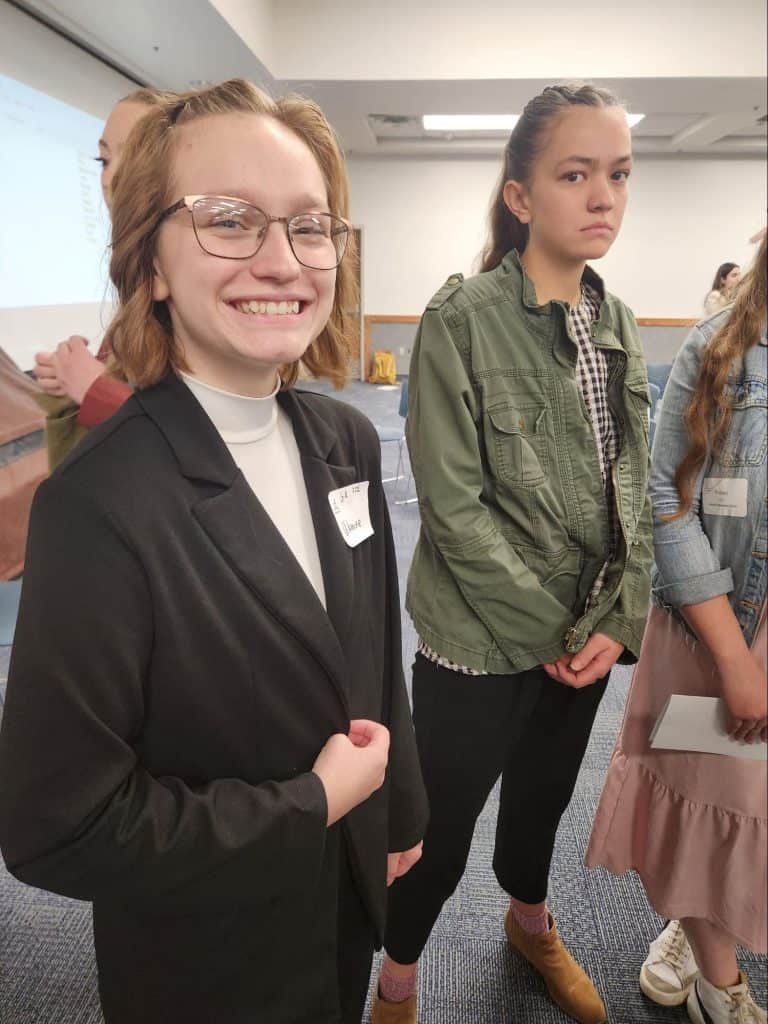
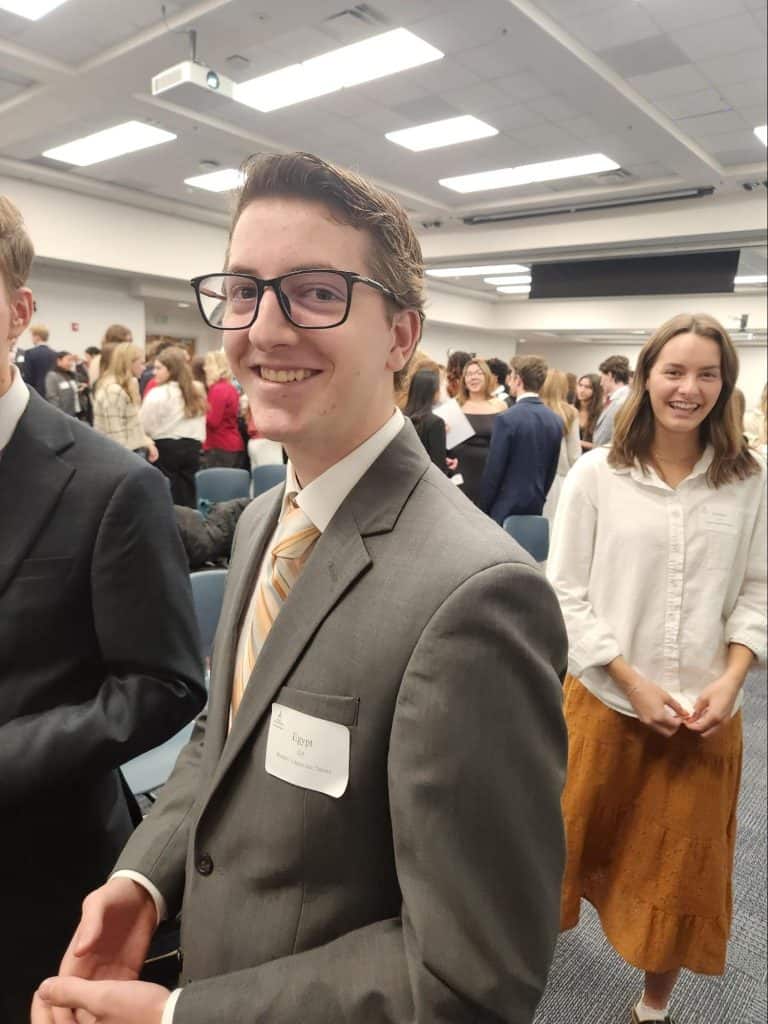
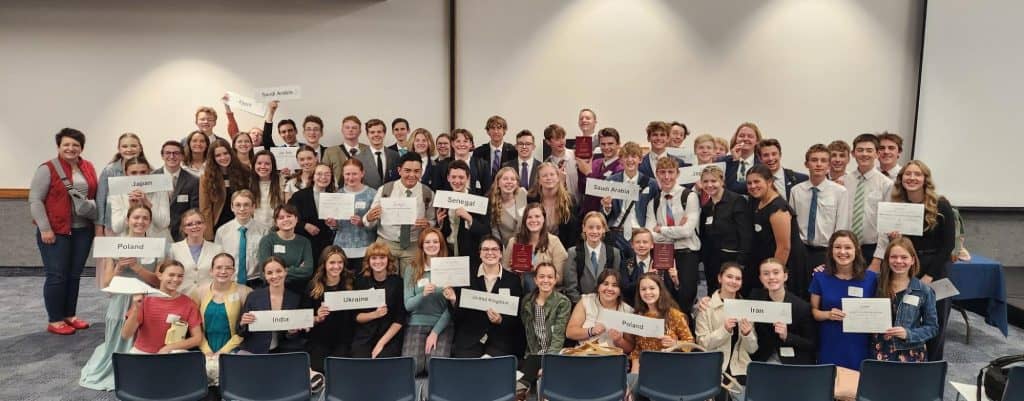
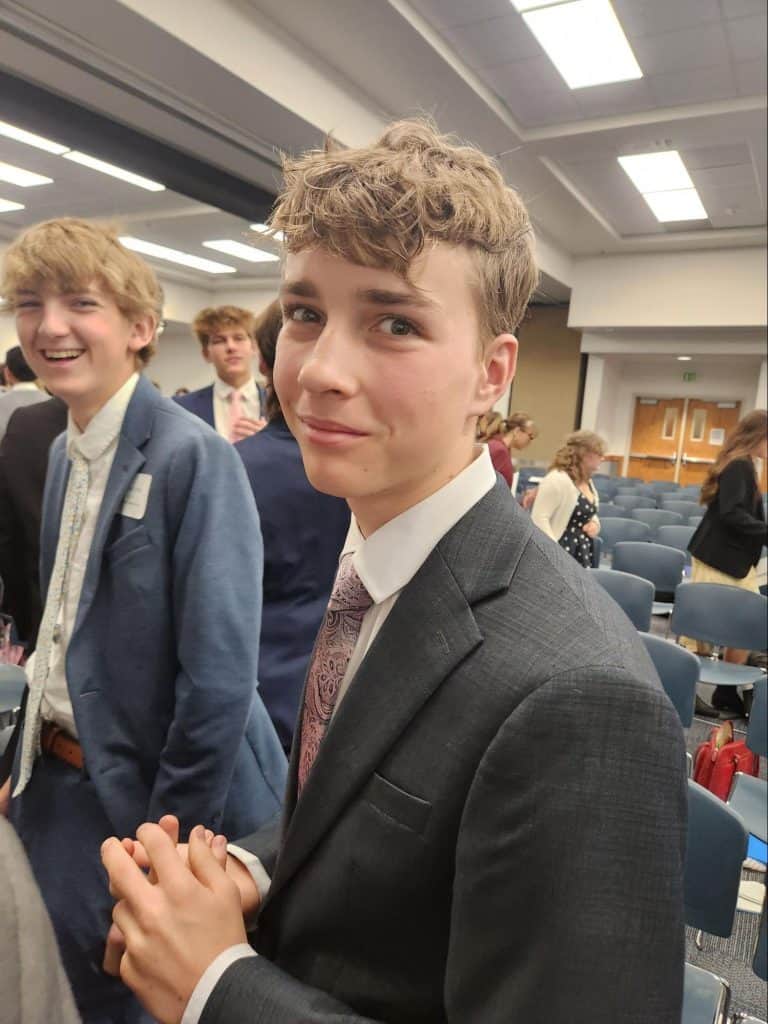
Alumni Corner
Alumni! We’d love to spotlight you! We want to know what you’re doing, celebrate your accomplishments, or hear how IEProgram classes have helped you as you’ve moved forward in life! Please let us know what you are doing here: Alumni Corner Submissions
We’ll share your contributions in future newsletters.
Insights in Education
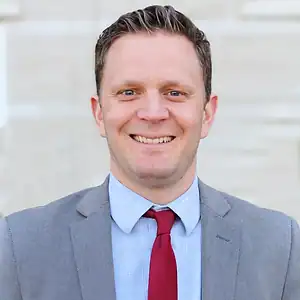
By Sam Martineau, General Director, Independent Education Program
Hatred Begets Hatred
Each year in the debate program we study a major philosophy with our debate students. Over time we’ve studied utilitarianism, Kantian ethics, and confucianism among other philosophies. With every new philosophy the experience is enriching because you get to see the world, ethics, or justice through a different framework and enlarge your ability to understand and explain what you see around you. I studied what came to be one of my favorite philosophies years ago: Just War Theory.
Unlike most philosophies, Just War Theory wasn’t developed by one or two thinkers. It has received contributions from many thinkers and documents over centuries including, for example, Saint Thomas Aquinas, the Catholic catechism, The Law of Nations, and The Geneva Convention.
The basic concept of Just War Theory is that it describes when war is just and when it is not. It describes jus ad bellum: the just causes for going to war, jus in bello: just action in war, and jus post bellum: the just resolution of war. Just War Theory makes requirements for war to be just such as exhausting diplomatic means before resorting to war, never going to war as an act of aggression, distinguishing between combatants and civilians in war, clearly marking soldiers so that armies can distinguish between combatants and civilians, holding those who commit crimes in war accountable, etc. In other words, in Just War Theory one can find the arguments and frameworks for understanding the traditional ideas of justice in war.
As I studied with students, I frequently encountered an interesting question. Students would often ask, in essence, “What is the point?” It’s a great question. You are already at war. You are already killing people. It’s hard to imagine rules more important than “don’t kill people.” So what is the point of making rules inside of a conflict when you are already breaking the most important rules one can imagine?
Among other answers, one key way to respond to the question is that, yes, war is terrible, but the hope is that it will be temporary. If there is going to be war, the desire is that it will last only while the causes of the conflict are still unresolved. Because while war is terrible, what is more terrible is intergenerational and never-ending conflict based not on a disagreement among nations, but rather on the hatred that two nations and sets of people have for each other. War that begins to be waged out of hatred inevitably involves breaches of the rules of war, which breeds hatred and further atrocities in a cycle of violence and hatred that is terribly difficult to escape.
The result of this sort of unjust war is that eventually you have two groups of people who cease to see each other as fully human and hatred breeds hatred that cycle with no horizon for peace. They both kill civilians and then justify it by saying, “Can’t you see that they are killing our civilians! You can’t expect us to show weakness in the face of such monsters!”
So if you can get nations to believe in Just War Theory and to place limits on how they behave, then your chances for true and eventual peace grow. Nations generally will not adhere perfectly to the rules of just war in conflict, but the more they do, the more likely those nations will be able to see and take on off-ramp to peace. And the less that nations adhere, the more likely it is that those off-ramps disappear as the initial causes for war are replaced by personal hatreds.
Which brings me now to the question I want to ask: can we build those off-ramps for our children and students?
In the wake of the Charlie Kirk shooting, it’s a question that has weighed on my mind. Like everyone else, when I first learned of the shooting, I was stunned that such a thing would happen so close to home. When I found out that I had students at the event, I prayed for their safety and offered gratitude upon finding out they were safe. And then soon after that a question forcefully came to mind: can we build off-ramps from conflict for our children?
As I read articles for updates shortly after the event, I also read through comments made on the articles. Many were thoughtful and temperate. Many were not. Many could be summed up as essentially saying, “I guess this is who democrats are. You try to reason with them and all they want to do is kill and destroy.” I wish I could say I was surprised by the comments, but I wasn’t. I knew what I would see before I started reading them. Hatred begets hatred. It is predictable between societies, and it is predictable inside of societies. The question is whether we can offer our children, and hopefully ourselves, an off-ramp from that conflict and hatred? I believe the answer is yes.
I’ve written about this question before, but perhaps it is more pressing now: why do people disagree with each other? How do we explain the existence of differing political parties, legal philosophies, ethical philosophies, and other disagreements on major issues? At first glance, how you answer this question for a child may seem unimportant, but it has a profound influence on how that child comes to see and interact with his or her world. I will attempt to explain why.
Any answer that you give on this question will, either consciously or subconsciously, land you somewhere on the question of complexity. In other words, you will end up taking a position on whether the world is simple and can be explained in simple terms or whether the world is complex and, to the extent that it is explainable, cannot be explained easily.
The reason that you end up taking a position on this issue when describing disagreement is because you will end up describing disagreement, to some degree or another, as fair and reasonable or as irresponsible and an attack. To make the point, maybe I can put the question to you. Why do you think that people disagree with you? You know that many people do. The things that you believe likely seem clear enough to you. So, why do others disagree?
You could potentially represent to yourself (or to your children or students) that the world is a simple enough place that any reasonable thinking person would come to the same conclusions you have. There are the answers. They lie before you as they lie before anyone. So the most likely explanation for the existence of dissenters is that they must be some combination of unintelligent, uninformed, and corrupt. Why else could they disagree when the truth is so plain? They must not have the intellectual capacity you have, must not have thought seriously about the issue as you have, or must want what is wrong unlike you, who wants what is right. The world is like math: if you think that one plus one equals three, then you are an idiot, haven’t cared to learn or observe, or want to get the answer wrong.
On the other hand, you could represent to yourself (or to your children or students) that the world is a complex enough place that reasonable and thinking people may disagree with each other on serious issues. As you contemplate the world and its meaning, you may recognize that people contain inside of themselves very different experiences from each other. The stories that they have experienced, the information that they have seen, the people that they have conversed with are limited and specific, and so they are not operating off a comprehensive picture. And, of course, that is easy to observe for others. But one could also, with some humility, observe that this is equally true for oneself. My own experiences and exposures are limited and specific.
One may also observe that even if many people observe the same experience or set of facts, they may draw different conclusions from those experiences and facts. Because life isn’t a dry set of mechanical experiences and observable facts. It also is comprehended in meaning and purpose, morality and resulting action. And while some facts may be observable enough (while others may not), what they mean may be obscure. If I might borrow from the New Testament, the facts aren’t always clear, but even if they are their meaning we may “see through a glass darkly.” In this case, the world isn’t so much like math as it is like psychology. We have ideas about what is going on in the human brain, many of them well established. But we don’t know enough to fully comprehend what is going on, and it is entirely possible for one reasonable thinker to emphasize psychoanalysis for the treatment of mental illness while another focuses on cognitive behavioral therapy.
And if this is the case, then it would make sense that in this world two people may be reasonable, intelligent, and moral and yet disagree on serious issues. So the best thing they might do is to try to understand one another in order to see how much common ground they might have to begin with, how much common ground they might make through discourse, and where the gap can’t be bridged, hopefully come to a clearer understanding of precisely why they disagree with each other.
So, again I ask, why do you think people disagree with you? Which of these explanations better represents your own experience, the people you know, how your own ideas have evolved over time, and the world as you observe it? For my own part, I often struggle to know how to interpret my experiences. My own moments of clarity are rare and precious to me. I have certainly evolved over time and, all the while, believe I have been an overall reasonable and decent person. I know many people whom I respect as intelligent and good people with whom I disagree on serious issues. And the world does not seem so simple to me as to be able to describe it in precise mathematical terms.
But not only does this viewpoint seem most in harmony with the world as I, and as I believe others, observe it. It is also an off-ramp from conflict.
Teaching children and students about the world in simple terms can seem attractive. It allows you to give them answers that they can rely on. It offers the comfort of easy certainties. It feels like you are more likely to be able to pass on your values to them reliably. But I argue that one should also consider the cost, because what is lost is an off-ramp from conflict both personal and societal.
The irony of the commenters in the articles I wrote about earlier is that they indulge the same thinking that, taken to the extreme, motivated political violence in the first place. I believe that I am right and you are wrong. The truth is plain, and you don’t see it. You are either an idiot or corrupt, and so if reason will not suffice to bring you to the truth, then other means must be found. Hatred breeds hatred. Democratic lawmakers are shot and killed in Minnesota last summer, and so Republicans must hate this country and anyone who is trying to make it better. Charlie Kirk is killed, and it must be that democrats are to blame because they committed the crime of having their own thoughts. Republican members of congress are shot at a baseball practice, and frankly they deserved it for the blood on their hands. Heather Hayer is run over and killed protesting the Unite the Right Rally in Charlottesville, and antifa is so terrible who could mourn that? And hatred begets hatred begets hatred. This is the cost of teaching that the world is such a simple place that only idiots and traitors could disagree: it is unsurprising when people finally conclude that those people hardly deserve to live at all.
In stark opposition to this concept of the world and the people in it are the teachings of Just War Theory, the New Testament, and the many luminaries of our world. Just War theory says that if there must be conflict, it shouldn’t be based on personal hatreds. Jesus of Nazareth points out that anyone can love those who love them back, but goodness is found in loving even your enemies. Gandhi says that, “Nonviolence is the law of our species as violence is the law of the brute.” Immanuel Kant claims that all rational beings are dignified and must be treated so. And Martin Luther King Jr. pleads that the search for justice must not be tainted by drinking from the cup of bitterness and hatred.
I submit that a starting point for loving your enemies, making conflict just, eschewing violence, treating all with dignity, and tossing away the cup of bitterness and hatred is coming to see those who disagree as people like yourself: flawed, limited in their knowledge, basically attempting to do what is best, and people that you might love or even respect. This concept of the world is a door we can open to peace.
Frankly, throughout their lives, our children will hear plenty of arguments that the world is a simple place, that bad people are purposefully trying to ruin their country and their lives, and that they should love their friends and disregard, refuse to listen to, not seek peace with, and should hate their enemies.
I hope as parents and educators that we’ll all consider whether this door to peace is one we are, in contrast, opening for our children as we teach them about the world around them. I also hope that it is a door we are opening for ourselves as we model how we think about our world and the people in it, and as we attempt to live good and peaceful lives.
